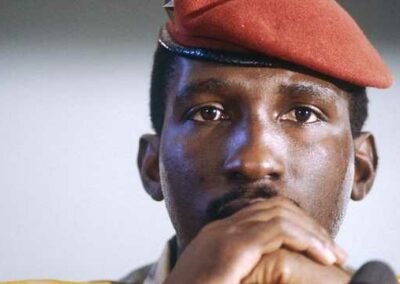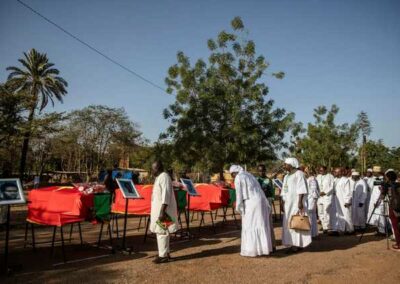“Ideas cannot be killed, ideas never die.” These were the words of Thomas Sankara on 9th October 1967. One week later, the famous leader of Burkina Faso was killed and like his words, his ideas lived on to this day.
Almost 30 years after his death, the body of the revolutionary and charismatic leader has been reburied. The bodies of the 12 other comrades killed alongside him were also laid to rest. The sober ceremony took place in the country’s capital, Ouagadougou, at the site of his assassination, which has since become a memorial for Sankara.
“That place is painful for us to put our feet there. A lot of people were tortured there and crimes committed there and murders,” Thomas Sankara’s younger brother Paul Sankara told The Associated Press news agency. He said the family had asked the government to bury him elsewhere but the military refused because he was a soldier.
Family members, soldiers, and community leaders paid tributes to the former president, whom many felt would have transformed the African country if he had governed for a reasonable period. Wrapped with the country’s flag the body of Sankara and the 12 other comrades were laid to rest.
The man called Sankara
Thomas Isidore Sankara was born on 21 December 1949. He was a Burkinabe military officer, who is prominent for being a Pan-African president of Burkina-Faso. As a military officer, Sankara was appointed Prime Minister in 1983. His vocal criticism of the government led to his arrest later that year. While still in detention, a group of revolutionaries in the military toppled the government and Sankara was chosen as president of the Republic of Upper Volta, the French colonial name for Burkina Faso. He became president on August 4 1983 and his actions confirmed that he was truly a revolutionary leader.
Sankara, a name written in gold
Although it has been thirty years since the death of Thomas Sankara, most Africans are familiar with the name, and there is no indication that the name would go into extinction in the coming years. His actions during his four-year reign as president were unique, and there has been arguably no African leader that matched his deeds.
The first bold step by Sankara was the rename the country, Upper Volta, to Burkina Faso which means the Land of Upright Men. The reason for the change of name was that he was dissatisfied with France, the country’s colonialist.
Sankara knew that the bid to create a great country was greater than simply renaming it. Hence, he was focused on creating self-sufficiency in food production and redistributing lands to the poor. His goal was to reduce Burkina Faso’s reliance on aid from foreign countries. Although the country accepted donations from other nations, Sankara pulled his country out of the International Monetary Fund (IMF) to actualise this dream.
Other reforms carried out by the then-young leader include the reform of the country’s judiciary and the vaccinations of all citizens against major epidemics like yellow fever, meningitis, measles, and other diseases. He also launched a nationwide literacy campaign and programs to assist the poor in the country.
Since Thomas Sankara, arguably, no African leader has championed women’s rights like him. Soon after taking office, he banned female genital mutilation, child marriage, and even polygamy. It is also on record that during his time as President, several women held various positions in his government.
While the issue of climate change has not been of international concern, Thomas Sankara knew a lot could go wrong if trees were not planted. Hence, he championed the preservation of the Sahel by planting over 10 million trees.
Despite trying to solve multiple problems simultaneously, Sankara did not forget the importance of education, potable water, and good health. Hence, he embarked on the aggressive construction of schools, water reservoirs, and other numerous infrastructures.
For everything Sankara did, he is more famous for his objective to make Africa a self-reliant continent without the support of Western allies and international monetary organizations. But the controversies surrounding his death remain controversial after 30 years.
Killed with more than a dozen bullets
Despite the high hopes in the government of the young leader, Thomas Sankara was assassinated on October 15 1987 by soldiers loyal to Blaise Compaore, his former colleague, who later became the country’s president.
Halouna Traore, who was the only survivor on the day Sankara was assassinated, said the killers singled him out for assassination, raining bullets to his back before he was buried in an unmarked grave.
“In terms of the wounds, what was found in relation to Thomas Sankara’s body is really mind-boggling. We can say he was purely and simply riddled with bullets,” Ambroise Farama, lawyer to Mariam, Sankara’s wife, told AFP following his autopsy. “Concerning the others, one or two gunshot wounds were found here and there. But as far as Thomas Sankara was concerned, there were more than a dozen all over the body.”
He added that a bullet was found in his armpit, which could be a sign that he surrendered even before he was killed.
His body would be later exhumed following the overthrow of the Compaore’s government in 2014. The 12 other victims of the unfortunate event were also buried in similar situations. One week before his death, Sankara’s speech on the 20th anniversary of the death of Che Guevara, he said:
Che Guevara taught us we could dare to have confidence in ourselves and confidence in our abilities. He instilled in us the conviction that struggle is our only recourse. He was a citizen of the free world that together we are in the process of building. That is why we say that Che Guevara is also African and Burkinabè.” That speech earned him the title “The Che Guevara” of Africa.
Although Campaore never claimed responsibility for Sankara’s murder, at the assumption of office, he accused the former leader of cutting ties with foreign countries, including France and neighbouring Cote d’Ivoire. Sankara was also accused of killing his political opponents.
Following his assumption as president, Campaore overturned almost all of Sankara’s policies and rejoined the IMF and the World Bank in a bid to get monetary support for the country.
Not free of criticism
Although Sankara is often regarded as an African hero, his deeds were not free of criticism. During his time as president, he was accused of extrajudicial killings, arbitrary detentions and other human rights violations. It was also said that during his time, prisoners were not granted fair trials and their rights were undermined.
Although Sankara saw his actions as part of the revolution, Amnesty International and other human rights groups criticized his method.
Was justice served?
Even though Compaoré suppressed all investigations into the death of Thomas Sankara, the matter was resurrected after he was forced out of the government with a massive nationwide protest. Upon investigation, the French government, whom Sankara’s wife accused of masterminding her husband’s death, was confirmed to have some of the documents relating to the murder. The government of Burkina Faso called on the French government to release the said documents to the country’s judiciary.
In April 2021, former President Compaore and 13 others were indicted for Sankara’s murder. One year later, Compaore was found guilty of the act and sentenced to life in prison in absentia. Two other officials also got similar punishments. However, eight others were sentenced to between 3 to 20 years in prison and the other three were discharged and acquitted.
Many have accused the country’s elite of colluding with foreign governments, especially France to murder the promising young leader. While the locals have been prosecuted, the role of Paris in the death of one of Africa’s greatest leaders remains a mirage.








0 Comments